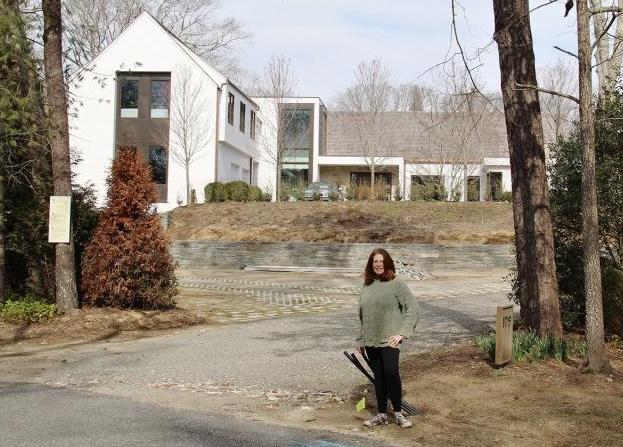It wasn’t on anyone’s agenda. That was because the big news to emerge from Tuesday’s East Hampton Town Board meeting came during the public comment portion.
That’s when Jaine Mehring, a member of the town’s Zoning Board of Appeals and litter action committee, and the founder of Build.In.Kind/East Hampton, announced the formation of the East Hampton Community Housing Trust.
Like the Peconic Land Trust, which purchases undeveloped land for conservation, the new entity will aim to buy land or buildings exclusively for affordable, year-round housing.
“The trust will be an independent, not-for-profit organization with a singular mission to create, steward, and sustain in perpetuity, stable, quality, economically attainable housing for the year-round residents of the Town of East Hampton,” Ms. Mehring told the board.
She asked to be invited back in early September so she could offer the board a full presentation. Board members seemed supportive.
“I think this is a wonderful thing. Affordable housing is one of the biggest needs that our town has, and I think as we go into the future, it’ll become only more important and frankly more difficult,” said Councilman Ian Calder-Piedmonte, during his liaison report. “It’s a big problem and we can’t do it ourselves. So, the fact that there is a private initiative to contribute is just fantastic.”
Ms. Mehring said that while “land trust” often implies conservation, a community land trust specifically focuses on acquiring land to develop and maintain affordable housing, both rentals and ownership opportunities.
In a phone call after the meeting, she said that such trusts have proven successful in other communities.
“The Island Housing Trust on Martha’s Vineyard is in its 14th year; that’s one of the organizations I looked at closely. Cape Cod and Nantucket both have a trust. They exist in seasonal communities where there is a massive consumption of land by transient, seasonal, wealthy folks and a displacement of the local population. There’s also an element of geographic limitation.”
In addition to accepting financial donations, the trust will seek in-kind contributions such as construction services and materials. Homes would be sold at below-market rates to eligible residents, with the trust retaining ownership of the land, similar to the model used for the town’s Cantwell Court development in Amagansett.
“When it sells the house, simultaneously the underlying land is leased to the buyer for a nominal fee via what is known as the long-term ‘ground lease,’” Ms. Mehring told the board. “The homeowner would also enter a ‘resale formula agreement’ with the trust, committing that when they sold the house, it must be sold to another eligible buyer on the trust’s waiting list at a price based on the seller’s equity in the house plus a fixed annual escalation percentage.”
Once the trust is formally established — it still needs to gain 501(c)(3) status — eligibility criteria will be finalized.
While town projects work with a scale of income eligibility ranging from 30 per cent of area median income to 130 percent, Ms. Mehring wants to identify the “missing middle,” perhaps from 130 A.M.I to 160 percent. “It’s a gap that’s not being served in the town,” she said.
Flexibility is also a goal.
“We’ll focus on people who live in East Hampton full time, but I don’t foresee a tenured eligibility, where someone would have to live in the town for five or 10 years. Because let’s say the next building inspector has lived elsewhere and now works for the town. I don’t want to exclude that person from living here,” she said. “I also wouldn’t support a ‘must work in East Hampton’ requirement. If you live in East Hampton, why shouldn’t you be able to commute to Bridgehampton or Southampton? You should be able to have mobility.”
“The bread and butter of the organization will be the ability to buy a modest lot, renovate the existing house and perhaps add an accessory dwelling unit,” she continued. “Or, maybe the trust can buy a somewhat larger lot and make a small pocket neighborhood, with four units. Over time, it’s about creating options. What I don’t see the trust doing are large 100-unit rentals. These are needed, but that niche is filled by other parties.”
In a separate press release, State Assemblyman Tommy John Schiavoni has announced that the Peconic Bay Community Preservation Fund and Community Housing Fund had combined revenues of $89.5 million for the first half of 2025. The C.P.F. is used for land purchases, while the C.H.F. can be used for housing projects.
The C.H.F. was approved in a 2022 voter referendum and was applied to real estate transactions after April 1, 2023. Since Jan. 2024, the C.H.F. has generated about $48 million.
Ms. Mehring said the C.H.F. can legally support nonprofit affordable housing efforts. “Certainly, I would imagine the trust will become a known quantity to them.”
“I’ve been wanting to do this for four years,” she said. “I was hoping to have two to four people to start it, because this is something that is bigger than me. I do believe by launching it, people I don’t even know will show up who have the expertise and passion to help make a difference. I’m just putting it out there.”




